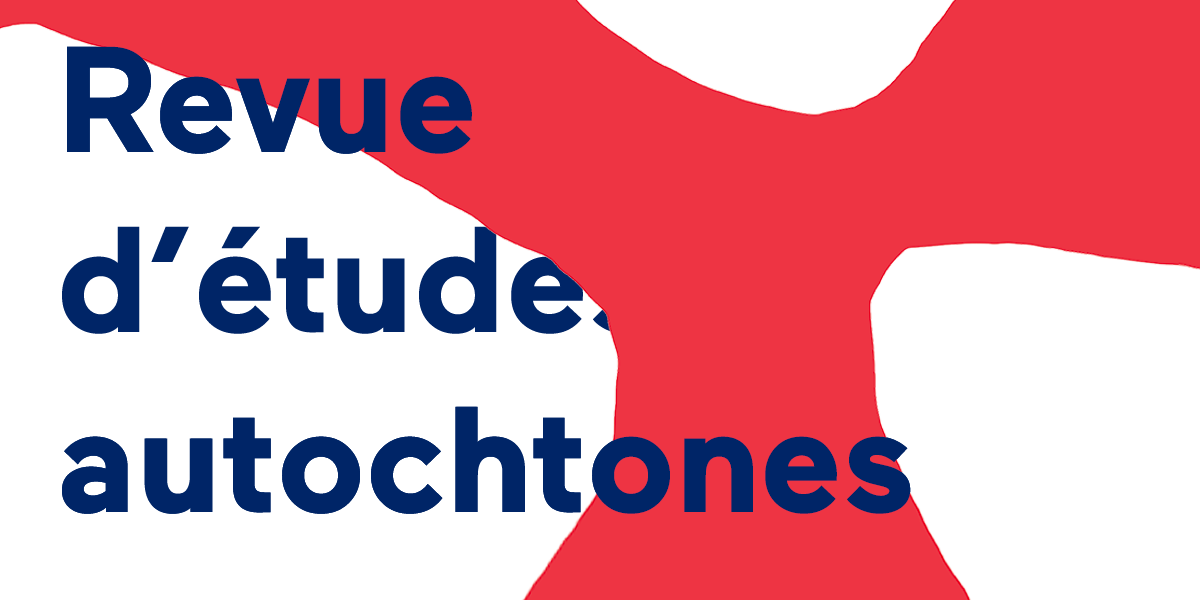
To mark National Indigenous History Month, Érudit spoke to the team behind the journal Revue d’études autochtones. We wanted to find out more about the journal’s name change officially announced at its 50th anniversary, as well as its role in shaping the field of Native Studies. Journal director Leila Inksetter and editor Éric Chalifoux answered our questions.
1. The journal was founded in 1971 under the title Recherches amérindiennes au Québec. How did the scientific community react to its creation? Was it a pioneer in its field?
The journal Recherches amérindiennes au Québec was created in response to the isolation of Québec-based researchers working on Indigenous issues in the ’60s and ’70s. The journal was meant to act as a bulletin board for these isolated researchers, but they quickly expressed a desire to publish scholarly articles, and this preoccupation became central. The journal had the following objectives:
-
- Publish in French to create a space where French-speaking researchers could express themselves.
- Contribute to knowledge about Indigenous societies and cultures in Québec (and better contextualize them, with an eye toward the whole of the Americas).
- Display a multidisciplinary character, by keeping its pages available for all researchers working on topics pertaining to First Nations studies, regardless of the field.
- Publish for the specialized audience, but also for the public at large.
Recherches amérindiennes au Québec was the first (and only) French-language journal publishing texts that exclusively dealt with Indigenous peoples of Québec and the Americas, making it a pioneer in that sense. It became a reference for rigorous French-language scholarly publishing on Indigenous issues, a reputation it still holds. The journal tries to integrate Indigenous people at every step of the production process (article writing, issue editing, editorial board participation, artistic production, etc.).
The Société Recherches amérindiennes au Québec (today Société Recherches autochtones au Québec) was founded in 1973. The Société is a publishing house dedicated to disseminating knowledge about the issues and realities of Indigenous peoples. It has been hosting the journal since then.
2. The journal changed its name in 2020 to Revue d’études autochtones. Can you tell us about the process that led to this new title?
Recherches amérindiennes au Québec began its renaming process in 2018 and went through several consultative steps. This process was the fruit of several discussions and collective decisions, motivated by a desire to reflect the current dynamics around research in Indigenous contexts, to favour the inclusion of Indigenous perspectives, and to reflect on the name of the journal itself. Indeed, in French, the term “Amérindien” had generally become obsolete.
In 2019, a first internal brainstorming process was launched by the editorial committee members and the board of directors of the Société Recherches amérindiennes au Québec.
It led to the creation of an external consultation committee made up of ten stakeholders in Indigenous research, who all belonged to a Québec First Nation.
These internal and external consultations made it possible to set various priorities, including a broader focus on international Indigenous issues, and the recommendation of adopting a new name to better reflect a more contemporary reality.
At the end of this brainstorming process, the term “amérindiennes” was replaced by “autochtones”, in line with evolving terminology in French, occurring both in Canada and abroad.
Over the five decades of its existence, the journal Recherches amérindiennes au Québec has always taken a critical perspective on knowledge production, as well as providing a rigorous contribution to French-language scholarly debates that help gain a better understanding of Indigenous realities. We want to keep pursuing these objectives while maintaining the highest standards of quality when it comes to scholarly publishing. The term “Autochtone” takes into account new developments in the process of defining Indigeneity around the world. The new title lets us maintain our mandate, while working even further on presenting within our pages multiple Indigenous realities, both in Québec and around the world.
The name change was announced officially during the symposium that highlighted the 50-year anniversary of Recherches amérindiennes au Québec in November 2021.
3. Your journal’s presentation highlights its multidisciplinary character. How does your journal contribute to shaping the field of Indigenous studies?
While the journal initially contained contributions covering mostly the fields of anthropology, ethnology, ethnolinguistic and archaeology, it quickly became apparent that Indigenous issues go far beyond those disciplines. The multidisciplinary approach enables us to understand Indigenous realities from different angles, taking into account their historical, socio-cultural, economic, political and environmental dimensions.
Over the years, the journal has published contributions to several disciplines such as anthropology, sociology, history, art history, political science, law, literary studies, geography and even the natural sciences. This multidisciplinary, maybe even pluridisciplinary, aspect lets us approach Indigenous issues from a more global perspective and to better understand the complexities of the social and cultural dynamics at play.
The journal plays an important role in Indigenous studies by providing a platform dedicated to publishing research, analysis and discussions in French on current and historical Indigenous cultures, societies and issues in Québec and elsewhere. It is still today the only multidisciplinary journal dedicated exclusively to Indigenous issues.
Concretely, each issue is articulated around a theme, approached from different angles and perspectives. Reviews of scholarly publications have been part of every issue since the very beginning. Finally, the journal sometimes publishes articles in other formats, such as research notes, interviews or opinion pieces (called points of view), offering a varied range of means of expression. For several decades, on top of scholarly articles, the journal also contained news and columns on legal matters. These have recently been removed in favour of other faster forms of communication. For their part, scholarly articles have become more and more central, with a trend toward the production of double issues. As a whole, these texts provide those interested in Indigenous studies with a diversity of perspectives in one place.
4. What importance does the journal give to publishing in French?
Revue d’études autochtones, and Recherches amérindiennes au Québec before it, publishes exclusively in French. The use of French was present in the journal’s objectives established at its founding meeting in 1971. Even if the journal accepts texts in languages other than French, each contribution accepted for publication (articles, research notes, columns, reports, etc.) is translated into French and undergoes a rigorous linguistic review before its publication. While there is a certain “internationalization” of knowledge, the journal considers it important and essential to disseminate research results in French.
5. Finally, could you highlight some articles published in Revue d’études autochtones (and Recherches amérindiennes au Québec) that have helped to further knowledge during the journal’s 53 years of existence?
A similar exercise was done for the last issue of Recherches amérindiennes au Québec (see RAQ, volume 50, number 3, 2020–2021) – which highlighted the fifty-year anniversary of the journal. Rather than presenting articles, we have chosen a few notable thematic issues, which illustrate the diversity of subjects covered by the journal through scholarly articles generally accompanied by columns (news, legal, etc.) and book reviews:
- La baie James des Amérindiens, RAQ, 1(4-5), 1971.
Titled “The Natives’ James Bay,” it was the first issue containing scholarly articles. It discussed the James Bay Project in a hard-hitting dossier on the human and social consequences arising from the flooding of a huge portion of Cree territory around the James Bay.
- Santé et problèmes sociaux, RAQ, 25(1), 1995.
Titled “Health and Social Problems,” this issue was edited by Jacques Leroux and contained several pieces related to Indigenous health in Québec. It also presented local initiatives aimed at taking over health and social services.
- Développements théoriques en archéologie, RAQ, 28(2), 1998.
Edited by Pierre Dumais and Jean Poirier and titled “Theoretical Developments in Archaeology,” this issue reflects on new theoretical developments in the field of archaeology. In the 1970s, 1980s and 1990s, the journal had produced several thematic issues on properly archaeological subjects, and this issue covered the progress that had been made.
- La Commission royale sur les peuples autochtones, RAQ, 37(1) 2007.
Edited by Michel Lavoie and titled “The Royal Commission on Aboriginal Peoples,” this issue covered the impacts of the Royal Commission on Aboriginal Peoples report, published ten years prior and which examined the relations between the Indigenous peoples of Canada and the Canadian state.
- Amérique latine, Guyane française, États-Unis, Canada, Nouvelle-Calédonie, RAQ, 44(2–3), 2014.
Edited by Martin Hébert, Cristhian Teófilo da Silva and Jonathan Lainey, and titled “Latin America, French Guyana, United, Canada, New Caledonia,” this issue presented comparative studies on Indigenous subject matters through widely diverse case studies, including Brazil, New Caledonia, Mexico, the Andes and Canada. The issue had a second part dedicated to the Wendat-Wyandot study symposium which had been held in 2012. Under the auspices of the Agence universitaire de la francophonie (AUF), this issue was produced in collaboration with the Brazilian journal Interethnic@: revue des études sur les relations interethniques, which simultaneously published Brazilian Portuguese translations of every text.
- Femmes autochtones : pour un retour à l’équilibre, RÉA, 51(2-3), 2021-2022.
The first issue under the new name, “Indigenous Women: Toward a Return to Balance” echoes two issues of Recherches amérindiennes au Québec published in 1983 and 1984 which covered topics specific to Indigenous women. This double issue aimed at giving an updated overview of the situation 40 years later, with a deeper understanding of certain actions undertaken by Indigenous women in Québec, and at correcting the balance of power among Indigenous peoples and with state authorities. It was edited by Suzy Basile, an Indigenous researcher. It also contained contributions from female Indigenous researchers.
If you would like any of the archive issues mentioned here which are not available online, you can contact the journal at this email address: revue@recherches-autochtones.org.
Eager to learn more about scholarly publishing? Read the other interviews of the ” 5 questions with…” series.
